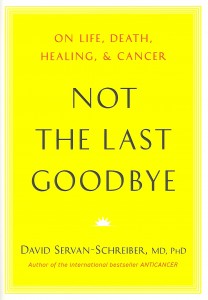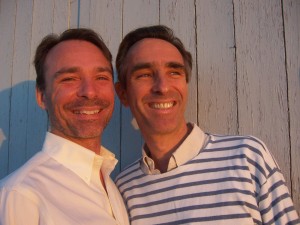 My friend Franklin Servan-Schreiber delivered a speech last week in Houston at the MD Anderson Cancer Center, and will speak on Tuesday at the Western Psychiatric Institute and Clinic in Pittsburgh about the final weeks of his brother, David Servan-Schreiber. Co-founder of the Center for Integrative Medicine at the University of Pittsburgh Medical Center and one of the founders of the US branch of Médecins Sans Frontières, David was the author of multiple bestsellers including Healing Without Freud or Prozac and Anticancer, A New Way of Life and ultimately of Not the Last Goodbye: On Life, Death, Healing and Cancer that came out in France one month before David died (July 2011) and was published in the US in November 2011.
My friend Franklin Servan-Schreiber delivered a speech last week in Houston at the MD Anderson Cancer Center, and will speak on Tuesday at the Western Psychiatric Institute and Clinic in Pittsburgh about the final weeks of his brother, David Servan-Schreiber. Co-founder of the Center for Integrative Medicine at the University of Pittsburgh Medical Center and one of the founders of the US branch of Médecins Sans Frontières, David was the author of multiple bestsellers including Healing Without Freud or Prozac and Anticancer, A New Way of Life and ultimately of Not the Last Goodbye: On Life, Death, Healing and Cancer that came out in France one month before David died (July 2011) and was published in the US in November 2011.
How can you die of cancer when most of you adult life was spent fighting it and helping other overcome this ordeal? David was diagnosed with brain cancer and operated in 1992 when he was 31 years old and he survived for nineteen years, despite a relapse in 2000. But on June 16, 2010, things weren’t looking good. The tumor was huge. He was just coming back from Detroit and here he was with a “ticking bomb inside [his] head.” No matter how famous you are and how knowledgeable about cancer you may to be, you are crushed. He took his bike to go back home. This was unsafe: “So why would I act so carelessly? Was it a fleeting suicidal impulse? A romantic wish to die on the cobbled streets of Paris? An attempt to escape the months of pain and anxiety that surely lay ahead of me.”
In just a few words, David described an overwhelming sense of dereliction, feeling betrayed by his body and ashamed of failing the millions of people who had read his books. He knew that his cancer would come back at some point. Yet, for years he had been able to “slow down the inevitable […] The thing I’d been dreading all these years had finally happened.”
 “The support from my loved ones was a gift from heaven.” As David writes, “the sicker you feel, the lonelier you feel, and the more anxious you become.” When I read those words first in the French version, and then in the American one, I felt a pang remembering the help that David tried to provide to my own brother, the year before. The support that David received from his family was amazing and is the reason why this book exists.
“The support from my loved ones was a gift from heaven.” As David writes, “the sicker you feel, the lonelier you feel, and the more anxious you become.” When I read those words first in the French version, and then in the American one, I felt a pang remembering the help that David tried to provide to my own brother, the year before. The support that David received from his family was amazing and is the reason why this book exists.
Over the months, David went through multiple treatments, but by February 2011, despair was settling in. He could not work any more and he didn’t have much to do, except to wait for death. He felt increasingly despondent, Franklin recounts, at the idea that his readers would forever be discouraged from following his recommendations. That’s when Franklin helped his brother rebuild a sense of purpose: “Let’s kill two birds with one stone,” Franklin told him. “First you are really bored between treatments. Second, you owe it to your public, the people who trust you to explain what is happening to you and you will fill up your life.” At first David resisted. He was tired. But one morning, as his voice was starting to disappear, Franklin left him no choice: “We need to do it now.” Franklin knew it was urgent. He reminded his audience that doctors rarely describe to their patients, let alone to their families, what’s going to happen step by step — but he himself was made aware by a friend that degradation in cancer patients is not linear, and that everything can go well until one morning everything goes wrong. The number of weeks David still had was unclear. What was obvious was that he might be unable to speak at anytime.
Franklin started to interview his brother in March 2011. His first question was unambiguous: “You are the author of Anticancer, you are dying of cancer. What do you have to say?” Wait for Chapter 11 before you know… for David had a lot to say over the course of seven interviews, transcribed by a journalist and infographic artist who had worked with him on Anticancer. David reviewed and corrected every single page. By June 15, 2011, the book was published, rose to number one in France the following week (believe it or not, people were reading this book on the beach!), and remained number one until the Fall. David died a month later.
Dying well : As David takes us through the various steps of his cancer and his treatment, he trains himself into the art of dying and into understanding what this really is about: “Today, as I am closer than ever to the final moment, I realize that I am reacting more or less like my patients I cared for as a psychiatrist […] Like many of them, I am afraid of suffering but I am not afraid of dying.” The text reads as a free-form recollection on the events that have structured his life, on what he learned from his patients, on what he would like his legacy to be — and on what he sees as the “balance sheet of [his] life.” In the end, dying well is “departing with a sense of peace and connection” — of connectedness to all the dear ones who lived before and will live after: “Our dead live in our hears. It’s the most comforting form of immortality, and the one that means the most to me.”
Cancer has now become the leading cause of death in America. Each of us will have to take care of cancer patients at some point. David’s book is a must read.

3 responses so far ↓
1 Heidi Feldman // Jan 29, 2012 at 10:40 pm
David gave me so much when I was diagnosed with cancer. He continues to contribute to us all, even after his transition. This is a short but awesome read.
2 Victoria Ford // Jan 31, 2012 at 11:06 am
This is a wonderful book, but a scary one for those of us with ‘incurable’ cancer and very poignant. Resistance may be futile, but we can do a great deal with nutrition and cleaning up our environment and exposure to carcinogens to make sure that we resist a LONG time.
3 Cathline Marshall // Feb 8, 2012 at 8:57 am
David was such an inspirational speaker and figure. He provided me with excellent advice when I was battling breast cancer, which guided me through the process. This book is moving and has helped me clarify how I want to live the rest of my life. David will be missed.
Leave a Comment